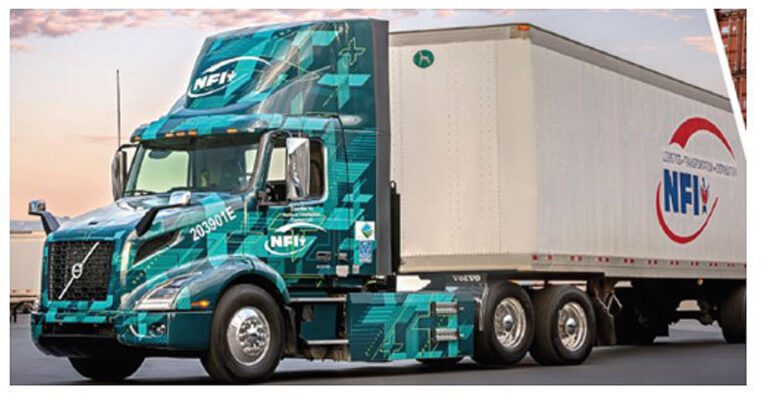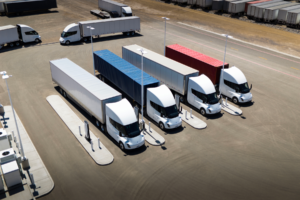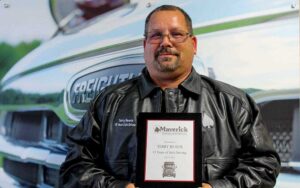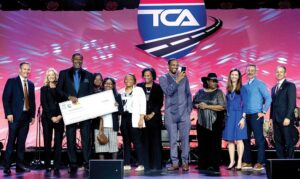ONTARIO, Calif. — Joint Electric Truck Scaling Initiative (JETSI) has announced that its project partner, NFI, has received all 50 Class 8 battery-electric trucks funded through the project, including 30 Freightliner eCascadia trucks and 20 Volvo VNR Electric trucks.
To support its scaled battery-electric fleet, NFI has collaborated with Electrify America and Southern California Edison to energize its electric charging depot at its warehouse facility in Ontario, California, completing a crucial milestone in the electrification of NFI’s dedicated port drayage services, a news release states.
NFI’s newly inaugurated electric truck maintenance shop at the site is also operational.
NFI’s battery-electric fleet is used to run routes from Ontario to the Ports of Los Angeles and Long Beach, performing drayage operations and delivering products to warehouses in Southern California – for customers spanning from manufacturing to retail. Its fleet of Freightliner eCascadia and Volvo VNR Electric trucks typically runs two port pickups per day, per truck, for an average of 220 miles driven between being recharged.
“NFI is committed to driving innovation and sustainability in the logistics and trucking industries,” said Brian Webb, president of port services, NFI. “Through NFI’s participation in the JETSI electrification project, battery-electric Class 8 trucks have proven to be a reliable and efficient solution for our drayage operations to deliver goods to our customers, many of which appreciate the zero-emission freight strategy we offer.”
NFI’s battery-electric fleet has collectively covered more than 2 million miles. As a result, NFI has eliminated the equivalent of 307,692 gallons of diesel fuel consumption and 3,415 metric tons of greenhouse gas emissions, according to the news release.
“Drayage trucks travel short distances between ports and regional warehouses, making them ideal candidates for zero-emissions technology, and this project in Ontario is an exemplary model for the future of freight transport,” said Liane Randolph, chair of the California Air Resources Board, one of the project’s state funders. “With 50 new zero-emissions trucks on the road and a new depot for charging infrastructure, the project is putting clean air solutions into action for a healthier California.”
According to JETSI officials, 50 additional battery-electric trucks deployed through the JETSI project will offset approximately 4,400 metric tons of greenhouse gas emissions yearly, resulting in 2.45 tons of weighted criteria pollutant emission reductions and displacing over 2,750,000 gallons of diesel throughout the five-year project.
“At Volvo Trucks North America, we applaud NFI’s pioneering efforts in integrating electric trucks into their operations. NFI’s participation in the JETSI project, utilizing Volvo VNR Electric trucks, showcases the viability and efficiency of electric Class 8 trucks in demanding applications such as port drayage. Together, we are driving positive change towards a more sustainable future,” said Peter Voorhoeve, president of Volvo Trucks North America.
In addition to NFI’s financial contribution, funding for 50 of NFI’s battery-electric trucks and its Ontario charging depot was provided through JETSI. which received $27 million in funding from CARB and the California Energy Commission. Additional funding was provided by South Coast AQMD, Mobile Source Air Pollution Reduction Review Committee, the Port of Long Beach and Southern California Edison.
The JETSI project is part of California Climate Investments, a statewide initiative aimed at reducing greenhouse gas emissions, strengthening the economy and improving public health and the environment.
“Daimler Truck North America congratulates NFI on the successful deployment of Freightliner eCascadia trucks as part of the JETSI project. NFI’s commitment to sustainable drayage operations is commendable, and this collaboration underscores the crucial role of public funding in supporting electric truck projects. As we continue to work together, we recognize the importance of such initiatives in driving innovation and accelerating the transition to a cleaner and more efficient transportation landscape,” said David Carson, senior vice president of sales and marketing at Daimler Truck North America.
To support its expanding battery-electric truck fleet, NFI worked with Southern California Edison and Electrify America to develop its charging depot supporting refueling speeds up to 350 kW for capable trucks and will feature roughly 7 MW of DC charging capacity shared across 38 individual DC fast chargers when the facility is fully completed.
“Through our Electrify Commercial business unit, Electrify America is proud to support NFI’s electrification goals by providing the critical charging infrastructure and microgrid solution needed at NFI’s Ontario facility. The JETSI project is a milestone accomplishment that underscores the power of collaboration in developing an electric truck charging depot of this magnitude,” said Robert Barrosa, president and CEO of Electrify America. “Electrify America and NFI are aligned in our vision for a sustainable future and our combined leadership is making real impact for zero-emission trucks.”
Later this year, NFI and Electrify America plan to enhance sustainability further by coupling approximately 1 MW of solar with nearly 8 MWh of on-site battery storage, enabling NFI to not only reduce its utility load during peak time-of-use energy prices but also enable resiliency from grid outages via the deployment of microgrid functionality.
“Electrifying drayage fleets and building out the needed charging infrastructure is key to zeroing out harmful diesel pollution,” said Commissioner Patty Monahan of the California Energy Commission. “The JETSI project is demonstrating that a zero-emission goods movement is possible, and this newly opened charging depot and electric truck maintenance shop is a glimpse into the future of electric port drayage services.”
Born in Pine Bluff, Arkansas, and raised in East Texas, John Worthen returned to his home state to attend college in 1998 and decided to make his life in The Natural State. Worthen is a 20-year veteran of the journalism industry and has covered just about every topic there is. He has a passion for writing and telling stories. He has worked as a beat reporter and bureau chief for a statewide newspaper and as managing editor of a regional newspaper in Arkansas. Additionally, Worthen has been a prolific freelance journalist for two decades, and has been published in several travel magazines and on travel websites.











